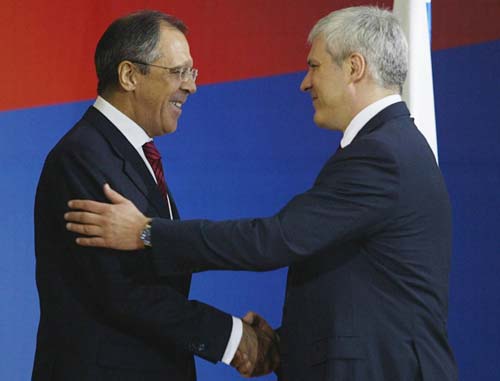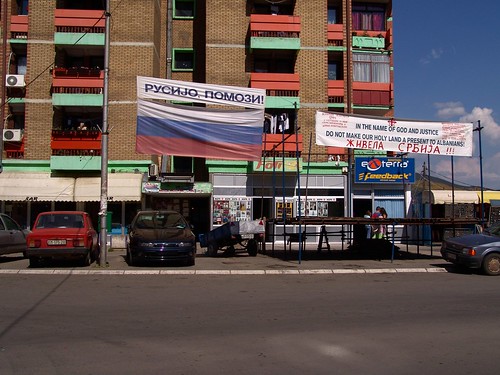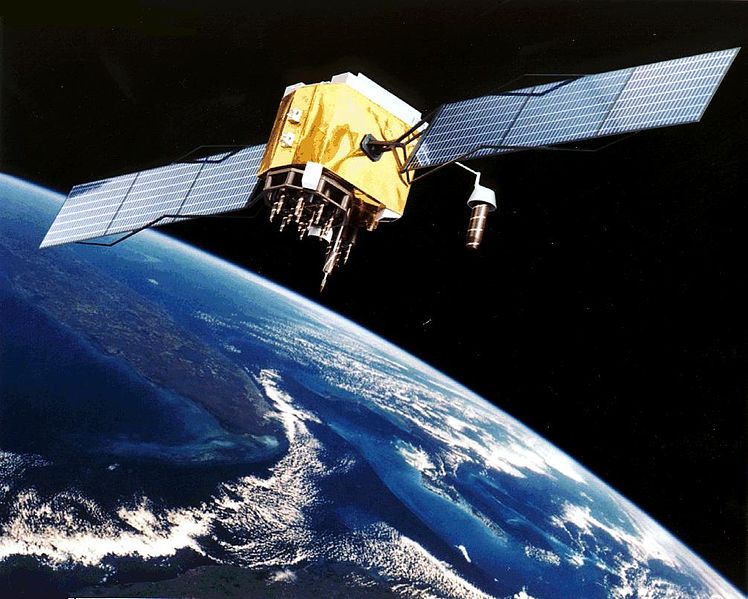Re: The Rise of the Russian Empire: Russo-Armenian Relations

Russia will reap its first big reward today for supporting Serbia in trying to stop Kosovo from declaring unilateral independence. Next week the European Union may suffer a serious reverse for doing the opposite, if Serbia elects a hardline nationalist president. The price of Kosovo's freedom is high. Gazprom, the Russian state-controlled gas monopoly, is to acquire a majority shareholding in NIS, the Serbian state oil monopoly, and in return incorporate the former Yugoslav republic into its proposed South Stream gas pipeline that will run under the Black Sea via Bulgaria to Greece and Italy.
The deal has already been approved by the Belgrade government, although the price to be paid for NIS has not been finalised. Whatever happens, Gazprom will get a bargain, as well as a customer for South Stream rather than the rival Nabucco pipeline project, intended to reduce EU dependence on Russian gas, without having to submit to any competitive bidding process. What has Russia done to deserve such favourable treatment? It has blocked a resolution in the United Nations Security Council to endorse Kosovo's independence. That will not stop the process, but it makes it much more difficult for other countries to grant the future state formal recognition. Although the US and most EU states will recognise it de facto, Kosovo will be left in a sort of legal limbo.
That suits President Vladimir Putin in three ways.
First, he is profoundly opposed to any process of national self-determination that allows a country such as Kosovo to declare independence unilaterally, rather than by agreement with the country from which it is separating. Today's Russia, after the collapse of the Soviet Union, is determined not to allow any other of its constituent parts to break away. That is why Moscow fought two bloody wars in Chechnya. Although Mr Putin hints that breakaway regions such as Abkhazia - part of Georgia, not Russia - might follow Kosovo, all the evidence suggests he wants nothing of the kind.
Second, he can exploit differences between EU members and the US. He knows that countries such as Spain, Greece and Cyprus hate the idea of self-determination, fearing it might be copied by Basque separatists or Turkish Cypriots. They are very unhappy about the precedent to be set by Kosovo. Best of all for the Kremlin, however, is the third benefit: the sweetheart deal for Gazprom. Its strongest supporter in Belgrade is Vojislav Kostunica, the prime minister, because he thinks Russia deserves a reward. Serbia also needs the gas.
Mr Kostunica got his way in cabinet this week because the pro-EU party in the government, the Democratic party of President Boris Tadic, desperately needs his backing to help Mr Tadic win the second round of the ongoing presidential election. In the first round last Sunday he trailed behind Tomislav Nikolic, nationalist leader of the anti-EU Radical party. Mr Kostunica is notorious for not showing his hand. Mr Nikolic may very well end up winning the run-off on February 3. That would be a disaster for EU relations with the most important country in the western Balkans.
Analysts in Moscow say Mr Putin might prefer Mr Tadic to win. He does not want to do business with an isolated Serbia. They dismiss suggestions that Russia's opposition to Kosovar independence reflects some sort of Orthodox Christian, Slavic solidarity with the Serbs. It is far more likely to be related to the Gazprom deal. This is classic behaviour by Russia Inc, a Russian state driven by money, not ideology.
There is also a strategic motive, although it is probably secondary. Every energy customer won by Gazprom further justifies construction of the South Stream gas pipeline rather than the alternative Nabucco pipeline to link central Asian suppliers via Turkey to Europe. Nabucco already has problems getting enough gas supplies to justify its construction. It will never get them without customers. Mr Putin must be laughing all the way to the bank.
Source: http://www.ft.com/cms/s/0/033ddc78-c...077b07658.html

Serbia has signed a multibillion-dollar deal that would make it a key hub for Russian energy supplies and strengthen Moscow's dominance of the European energy market. The agreement includes building a branch of a prospective major natural gas pipeline and a huge gas storage facility in Serbia. A separate agreement also lays the groundwork for Russia's state gas monopoly, OAO Gazprom, to acquire a controlling stake in Serbia's state oil company NIS. "The agreements signed would make Serbia a key hub in the prospective network of Russian energy supplies to southern Europe," Russian President Vladimir Putin said after Friday's signing. "This network will be long-lasting, reliable, highly efficient and -- what is very important -- help boost energy supplies to Serbia and the entire European continent."
The agreements, which Serbian officials have estimated as worth at least $2.2 billion, would include building a branch of the prospective South Stream natural gas pipeline in Serbia. South Stream would run under the Black Sea from Russia to Bulgaria, from where it would branch off. The section through Serbia would carry at least 10 billion cubic meters a year, Gazprom CEO Alexei Miller said. The 550-mile, $15 billion project undercuts the prospective United States and EU-backed Nabucco pipeline designed to ease Europe's reliance on Russia by carrying gas from the Middle East and Caspian countries other than Russia via Turkey.
Serbia President Boris Tadic said the deal would bolster his country's standing by making it a key transit country for energy supplies to Europe. "This agreement has a huge strategic importance for Serbia," Tadic said. "It will strengthen Serbia's strategic positions in southeastern Europe, since it will serve as a transit point for gas supplies to the EU's southern flank." Belgrade has turned increasingly away from the West and toward Russia, which has supported Serbia in the debate over independence for the province of Kosovo. Tadic and Serbian Prime Minister Vojislav Kostunica both thanked Moscow for its support on Kosovo at the start of the talks with Putin. "Serbia very deeply respects the position of Russia on Kosovo," Tadic said at the start Friday's talks with Putin. "We will defend our interests in Kosovo, operating on the basis of international law and we will never do otherwise."
Russia has used the rift to strengthen business and diplomatic ties to Serbia, with which Moscow has historic cultural and linguistic ties. Serbia endorsed the energy deal after Putin won Bulgaria's support last week for the South Stream project. The terms of the deal for Gazprom to acquire a 51 percent stake in Serbia's state oil company NIS were not announced. But Serbia's Energy Minister Aleksandar Popovic has confirmed reports that Russia offered $600 million -- just one-fifth of the company's estimated market value -- and an additional $730 million in modernizing the run-down company. Popovic said Tuesday that Serbia would try to better the price in further negotiations.
Source: http://edition.cnn.com/2008/BUSINESS...sia.serbia.ap/

President Vladimir Putin said on Friday that Russia was categorically opposed to independence for the Serbian province of Kosovo and added that Belgrade could count on Moscow as a reliable friend and partner. Putin told reporters after meeting Serbian leaders at the Kremlin that Kosovo independence "would cause serious damage to the whole system of international law, bring negative consequences for the Balkans, for the world and for stability in other regions".
Source: http://www.reuters.com/article/europ...s/idUSL2546322
Serbian victory for Putin and Russia Inc

Russia will reap its first big reward today for supporting Serbia in trying to stop Kosovo from declaring unilateral independence. Next week the European Union may suffer a serious reverse for doing the opposite, if Serbia elects a hardline nationalist president. The price of Kosovo's freedom is high. Gazprom, the Russian state-controlled gas monopoly, is to acquire a majority shareholding in NIS, the Serbian state oil monopoly, and in return incorporate the former Yugoslav republic into its proposed South Stream gas pipeline that will run under the Black Sea via Bulgaria to Greece and Italy.
The deal has already been approved by the Belgrade government, although the price to be paid for NIS has not been finalised. Whatever happens, Gazprom will get a bargain, as well as a customer for South Stream rather than the rival Nabucco pipeline project, intended to reduce EU dependence on Russian gas, without having to submit to any competitive bidding process. What has Russia done to deserve such favourable treatment? It has blocked a resolution in the United Nations Security Council to endorse Kosovo's independence. That will not stop the process, but it makes it much more difficult for other countries to grant the future state formal recognition. Although the US and most EU states will recognise it de facto, Kosovo will be left in a sort of legal limbo.
That suits President Vladimir Putin in three ways.
First, he is profoundly opposed to any process of national self-determination that allows a country such as Kosovo to declare independence unilaterally, rather than by agreement with the country from which it is separating. Today's Russia, after the collapse of the Soviet Union, is determined not to allow any other of its constituent parts to break away. That is why Moscow fought two bloody wars in Chechnya. Although Mr Putin hints that breakaway regions such as Abkhazia - part of Georgia, not Russia - might follow Kosovo, all the evidence suggests he wants nothing of the kind.
Second, he can exploit differences between EU members and the US. He knows that countries such as Spain, Greece and Cyprus hate the idea of self-determination, fearing it might be copied by Basque separatists or Turkish Cypriots. They are very unhappy about the precedent to be set by Kosovo. Best of all for the Kremlin, however, is the third benefit: the sweetheart deal for Gazprom. Its strongest supporter in Belgrade is Vojislav Kostunica, the prime minister, because he thinks Russia deserves a reward. Serbia also needs the gas.
Mr Kostunica got his way in cabinet this week because the pro-EU party in the government, the Democratic party of President Boris Tadic, desperately needs his backing to help Mr Tadic win the second round of the ongoing presidential election. In the first round last Sunday he trailed behind Tomislav Nikolic, nationalist leader of the anti-EU Radical party. Mr Kostunica is notorious for not showing his hand. Mr Nikolic may very well end up winning the run-off on February 3. That would be a disaster for EU relations with the most important country in the western Balkans.
Analysts in Moscow say Mr Putin might prefer Mr Tadic to win. He does not want to do business with an isolated Serbia. They dismiss suggestions that Russia's opposition to Kosovar independence reflects some sort of Orthodox Christian, Slavic solidarity with the Serbs. It is far more likely to be related to the Gazprom deal. This is classic behaviour by Russia Inc, a Russian state driven by money, not ideology.
There is also a strategic motive, although it is probably secondary. Every energy customer won by Gazprom further justifies construction of the South Stream gas pipeline rather than the alternative Nabucco pipeline to link central Asian suppliers via Turkey to Europe. Nabucco already has problems getting enough gas supplies to justify its construction. It will never get them without customers. Mr Putin must be laughing all the way to the bank.
Source: http://www.ft.com/cms/s/0/033ddc78-c...077b07658.html
Russia seals $2.2B Serbia gas deal

Serbia has signed a multibillion-dollar deal that would make it a key hub for Russian energy supplies and strengthen Moscow's dominance of the European energy market. The agreement includes building a branch of a prospective major natural gas pipeline and a huge gas storage facility in Serbia. A separate agreement also lays the groundwork for Russia's state gas monopoly, OAO Gazprom, to acquire a controlling stake in Serbia's state oil company NIS. "The agreements signed would make Serbia a key hub in the prospective network of Russian energy supplies to southern Europe," Russian President Vladimir Putin said after Friday's signing. "This network will be long-lasting, reliable, highly efficient and -- what is very important -- help boost energy supplies to Serbia and the entire European continent."
The agreements, which Serbian officials have estimated as worth at least $2.2 billion, would include building a branch of the prospective South Stream natural gas pipeline in Serbia. South Stream would run under the Black Sea from Russia to Bulgaria, from where it would branch off. The section through Serbia would carry at least 10 billion cubic meters a year, Gazprom CEO Alexei Miller said. The 550-mile, $15 billion project undercuts the prospective United States and EU-backed Nabucco pipeline designed to ease Europe's reliance on Russia by carrying gas from the Middle East and Caspian countries other than Russia via Turkey.
Serbia President Boris Tadic said the deal would bolster his country's standing by making it a key transit country for energy supplies to Europe. "This agreement has a huge strategic importance for Serbia," Tadic said. "It will strengthen Serbia's strategic positions in southeastern Europe, since it will serve as a transit point for gas supplies to the EU's southern flank." Belgrade has turned increasingly away from the West and toward Russia, which has supported Serbia in the debate over independence for the province of Kosovo. Tadic and Serbian Prime Minister Vojislav Kostunica both thanked Moscow for its support on Kosovo at the start of the talks with Putin. "Serbia very deeply respects the position of Russia on Kosovo," Tadic said at the start Friday's talks with Putin. "We will defend our interests in Kosovo, operating on the basis of international law and we will never do otherwise."
Russia has used the rift to strengthen business and diplomatic ties to Serbia, with which Moscow has historic cultural and linguistic ties. Serbia endorsed the energy deal after Putin won Bulgaria's support last week for the South Stream project. The terms of the deal for Gazprom to acquire a 51 percent stake in Serbia's state oil company NIS were not announced. But Serbia's Energy Minister Aleksandar Popovic has confirmed reports that Russia offered $600 million -- just one-fifth of the company's estimated market value -- and an additional $730 million in modernizing the run-down company. Popovic said Tuesday that Serbia would try to better the price in further negotiations.
Source: http://edition.cnn.com/2008/BUSINESS...sia.serbia.ap/
Putin says Serbia can count on Russia

President Vladimir Putin said on Friday that Russia was categorically opposed to independence for the Serbian province of Kosovo and added that Belgrade could count on Moscow as a reliable friend and partner. Putin told reporters after meeting Serbian leaders at the Kremlin that Kosovo independence "would cause serious damage to the whole system of international law, bring negative consequences for the Balkans, for the world and for stability in other regions".
Source: http://www.reuters.com/article/europ...s/idUSL2546322














 Is Russia's secret services as active as they were during the Cold War years? I certainly hope so! I gather this rat wont be having any "sushi" with any of his expats anytime soon...
Is Russia's secret services as active as they were during the Cold War years? I certainly hope so! I gather this rat wont be having any "sushi" with any of his expats anytime soon... 
Comment